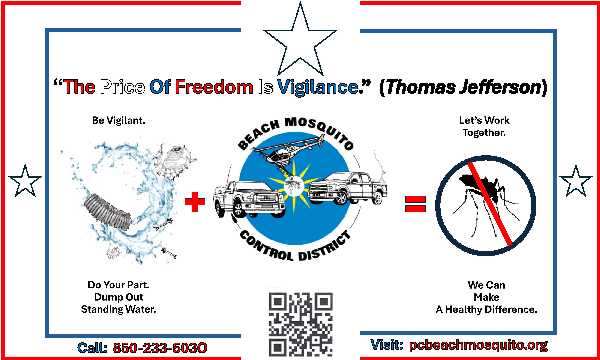By Cindy Mulla, Beach Mosquito Control District
Oh, say, can you hear the mosquito buzzing in your ear? What can you do to stop it from bugging you? You can try to swat it in mid-air, but alas, it will not care. So, what can you do to deter or eliminate these combative mosquitoes that try to conquer your outdoor objective to have fun?
“Kit-Up soldier!” (Gear-up)
Before heading on your outdoor mission to work or have fun, remember to wear your invisible protective gear; insect repellent to prevent receiving unwanted bites or mosquito-borne disease. For proper protection, use an Environmental Protection Agency (EPA) approved registered product that is both safe and effective. Always read the label and follow the instructions. Just like sunscreen, reapplication of an insect repellent is key for it to work properly. The lower the percentage of the repellent’s main active ingredient, the more frequently you will need to reapply it. When travelling abroad, do not forget to pack repellent. We do not want you to bring back any unwanted souvenirs to share (Dengue Fever, Chikungunya, Zika or Malaria). Do not forget to protect your pets by administering a monthly heartworm protection product. Horse owners, please keep your horses’ vaccines up to date, especially against mosquito-borne disease. Pet owners, please be responsible, have your pets routinely examined by a licensed veterinarian, and follow their preventive advice.
Know the enemy.
Bay County consistently will have up to thirty-six distinct species seasonally and fifty annually. Seventeen of these species have the potential to transmit disease. The female mosquito only bites and can spread the mosquito-borne disease West Nile Virus (WNV), Eastern Equine Encephalitis (EEE), and St. Louis Encephalitis (SLE). It takes just one blood meal for her to produce 250-300 eggs. Mosquitoes are aquatic insects because the eggs need water to hatch, plus both the larval and pupal stages need water to live in until they emerge into the winged adult stage.
Surveillance is the first strategic/tactical step for your mission mosquito operational plan of action against the mosquito frontline. Be on the lookout for all locations that can successfully support the aquatic mosquito life cycle stages. Immediately drain and remove the source(s) of concern. Examples of notorious outdoor objects capable of collecting/holding standing water from rain or lawn sprinkler systems are any type of open container, wheelbarrows, old paint cans, fountains without filtration, bird baths, pet dishes, plant trays, buckets, unkept large swimming to small kiddy pools, children’s toys, tarps, boats (including kayaks/canoes), trash & uncovered trash cans/dumpsters and old tires. After the source is located, dump out the excess water, remove the item or store it. Oh, do not forget to look up! Check your rain gutters. Make certain that the water can properly flow. To successfully keep the encroaching enemy at bay, one must be committed to repeating this surveillance tactic weekly.
If you are following these strategic tactics and you are still experiencing mosquito air assaults, contact the competent reinforcement professionals at Beach Mosquito Control District.
Remember, mosquitoes are the world’s deadliest creatures. Accordingly, please do not hesitate to contact Beach Mosquito Control District to place your service request for all your mosquito concerns, call (850) 233-5030 or visit: www.pcbeachmosquito.org.
We base our science-based mosquito control methods and treatments on the number and location of service requests we receive from the public and our mosquito surveillance program. This service is possible through levying a local ad valorem tax with no additional cost to you. So do not wait, contact us today!

“The Price of Outdoor Freedom Is Vigilance.”
“Drain or the mosquitoes will remain!” C. Mulla























































